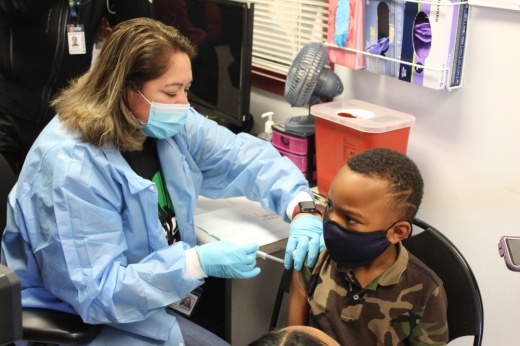Amid a rise in COVID-19 hospitalizations as the omicron variant travels around Harris County, public health officials are preparing to acquire additional nurses for local hospitals.
With COVID-19 hospitalizations and hospital staffing shortages once again on the rise, Texas officials will be sending 972 nurses to help hospitals across the state, said Lori Upton, vice president of regional nonprofit Southeast Texas Regional Advisory Council, at the Jan. 4 Harris County Commissioners court meeting. Of those employees, 356 will be going to Harris County institutions. The state’s added staff members will still leave Harris County hospitals looking for almost 900 more professionals, however, Upton said.
“That doesn't quite meet their needs,” Upton added. “All of the hospitals in Harris County that you provided staff to last year—their total request this round was 1,257 [staff members].”
During the last two weeks in Harris County, about 112 new COVID-19 cases have been reported per day, according to county data. In that same time period, the COVID-19 hospital population hit about 13% for intensive care unit beds.
In August, Harris County approved a $30 million contract with SETRAC to procure nurses and help local hospitals amid staffing shortages caused by the pandemic.
Harris County Public Health is readying to send more nurses, if needed, Judge Lina Hidalgo said Jan. 4.
“What the public health team has already done, and they're on standby, is [ensure] that we have a nursing contract ready to go,” Hidalgo said. “So that if we need more nurses, additional to the ones that the state has sent us through SETRAC, that we can do it even faster than we did it back in the summer.”
In August the nursing shortage was chalked up to employee burnout during the ongoing pandemic and because many local employees left to help at hospitals across the country, Hidalgo said.
“Now, it's obviously partly those reasons but also because omicron is so transmissible the staff themselves [are] getting the virus,” Hidalgo added.
Harris County’s emergency COVID-19 indicators are at a Level 2, which is the second most urgent level. If the hospital population continues to rise, Hidalgo said, the county will hit Level 1, the highest level of severity.
For a Level 1 threat level, county officials recommend residents stay home unless they are fully vaccinated.
“What all of us can do to keep these hospitals from being stretched thin is to get the vaccine and the booster so that COVID[-19] patients don't end up in the hospital,” Hidalgo said. “And wear the masks so that our hospital workers don't end up with the virus.”
Also at the meeting, commissioners approved the purchase of 55,000 rapid antigen COVID-19 tests in a 3-2 vote, with Commissioners Jack Cagle and Tom Ramsey dissenting. The tests will cost the county about $605,000 and they will be distributed to school districts and other entities.
“At this point, we're prioritizing schools as well as federally qualified health centers and clinics that serve vulnerable, underserved populations to make sure that they have access to these rapid tests,” HCPH Executive Director Barbie Robinson said.





